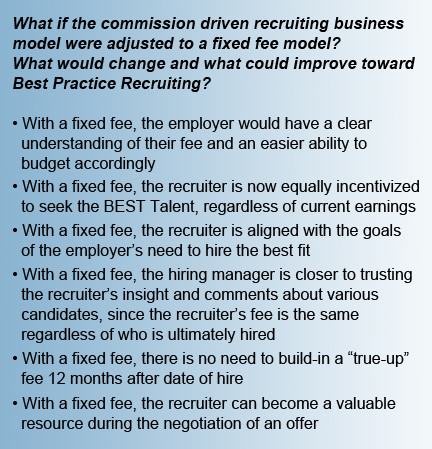As an employer, do you think of the word “TRUST” when you think of an outside recruiting resource? If not, why not?

To answer that, question let’s dissect the current business relationship between the hiring manager and the outside recruiter.
As business professionals, hiring managers must evaluate the value of contracting with an outside recruiting resource versus attempts to recruit critical talent through alternative means that include in-house resources. Hiring managers ideally want a trusted resource to deliver top level candidates to their company.
If we were involved in the sales of real estate, both the seller and the listing realtor would benefit from the selling price being as high as possible. To that point, “more is better.”
However, in recruiting, the most expensive candidate is not necessarily the best fit—or even the best candidate.
The standard business recruiting model establishes the hiring manager at a juxtaposed position from the recruiting resource. Most recruiting business models use a fee structure that is commission based. In other words, the fee paid to the recruiter is calculated as a percentage of the annual earnings of the talent being hired.
In situations where a revenue producer is being recruited, the fee structure can become more complicated when a final fee or “true-up” is calculated 12 months after the sales employee has been hired. This is done in order to calculate the final recruiting fee payment based on a percentage of the actual 12 month total earnings of the recruited sales employee.
Not many employers want to be paying a portion of recruiting fees 12 months after they have hired new talent.
From an alignment and positioning perspective, the traditional recruiting business model is the start of a mis-aligned relationship between the recruiter and hiring manager, as well as a mis-alignment between the recruiter and the candidates.
The structure of this type of business relationship incentivizes the recruiter to seek the most expensive talent, as this hire would reward the recruiter with the highest fee payment. This model encourages the recruiter to pay less attention to candidates with great potential but whose salary from the hiring company would be lower—resulting in a lower commission for the recruiter.
On the opposite side is the hiring manager who is seeking the finest talent and the best fit. Best Practice Recruiting should attract and consider all qualified candidates, from the seasoned and experienced high earners to those with high potential/less experience with lower earnings. Without objectively seeking a rounded group of candidates, the employer loses and the candidates are underserved.
Some individuals with great potential and lower current earnings turn out to be superb candidates and excellent employees. I have seen this first hand on numerous occasions.
With a commission based business model in place, the recruiter is not aligned with the needs of the company’s hiring manager. The recruiter has been positioned to reap the highest financial rewards or biggest fee. The hiring manager is seeking the best fit all the while attempting to obtain a sense of the candidates under consideration. Hiring managers recognize their recruiting resource has developed some rapport with candidates and they are usually interested in the recruiter’s comments and insight.

However, if the recruiter is under a commission based fee structure, how comfortable is the hiring manager going to be with the recruiter’s insight? If the recruiter sings the praise of a seasoned, well qualified and highly compensated candidate, isn’t the hiring manger going to wonder if some of the recruiter’s praise is an effort to receive the highest possible commission fee? Even if this is not the case, how much can the hiring manager trust the recruiter’s comments as long as the hiring manager is wondering about the influence of the commission based fee?
Perhaps it is time to reevaluate the outdated recruiting business model and change the conversation.
Most recruiters would agree that it takes no more time to recruit the highly compensated candidates as it does to recruit lower compensated candidates. The effort is the same.
In conclusion, impactful talent recruitment is critical for company growth. The value of Best Practices Recruiting is integral to a business’s success. With so much at stake, trust must be at the foundation of the hiring process. Alignment of purpose with talent recruitment is what engenders trust between the hiring manager and the outside recruiting resource.
If we change the conversation and adjust the current business model, how much better would the result be for the employer and for the candidates?
Good hunting.

About Boxwood Search and Bert Sadtler
Boxwood is a management, consulting-recruiting firm with offices in the greater Washington DC region as well in Tampa Bay, Florida, and provides solutions for employers needing critical talent. As a dedicated, consulting resource to the employer, Boxwood has designed compensation models that reflects current trends and develops and launches senior level recruitment campaigns to acquire appropriate talent. Position examples include: CFO, COO, Senior Program Manager, Vice President of Sales, Director of Marketing, Vice President of Engineering, Director of Contracts & Compliance and Vice President of Business Development. Examples of industries have included: Government Contracting, The Intelligence Community and the Communications/Technology Sector.
Bert Sadtler is an invited speaker to discuss the shift in the recruitment paradigm toward acquiring critical senior level talent as well as the shift in the employer’s performance based compensation model. Bert can be reached at: BertSadtler@BoxwoodSearch.com.



